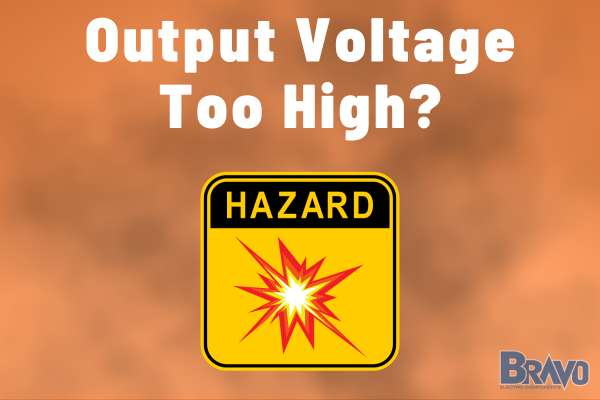
Ensuring optimal power supply operation is essential for any industry - from the medical field to industrial use cases. Yet, amidst the jumble of cables, controls, and components, there's a frequent oversight: the ramifications of utilizing a higher voltage power supply than required.
But you’d rather have more more power than not enough, right? What happens if you use a higher voltage power supply?
We encounter professionals grappling with unforeseen equipment malfunctions or even outright failures, only to trace back the root cause to an overpowered supply.
While the myth that “more power equals better performance” still floats around, we’re here to dispel it by unpacking a few common consequences of providing more power than necessary.
We'll unravel the true effects of excess voltage, the stealthy damages it inflicts, and how you, as a vigilant professional, can shield your operations and make informed decisions, backed by the trusted guidance of Bravo Electro.
Understanding Voltage and Power Supply
At the heart of any industrial operation lies the foundation of electricity. Power supplies provide the necessary juice to keep our operations running smoothly. However, understanding these powerhouses requires a deeper insight into the concept of power supply voltage.
Voltage, often symbolized by the letter 'V', is the electrical force responsible for pushing electrons through a circuit. In simpler terms, it's the 'pressure' behind the electrical current.
Just like water in a pipeline, if the pressure is too high, it can lead to ruptures. On the other hand, the flow might not be sufficient for operation if it's too low. We recently discussed this in our guide to what happens if your PSU is too weak.
Industrial power supplies are designed to convert our primary electrical source into a usable format for machines and devices. They ensure a steady, reliable flow of electricity, maintaining the balance between too much and too little voltage.
Each power supply is rated for a particular voltage, ensuring that devices connected to it receive the precise amount of energy they need to function effectively. While the appeal of a universal power supply is undeniable, the fact of the matter is you need the proper power supply size for your unique use case.
But why is this so important? What happens if you use a higher voltage power supply? We’ll look at the four most common outcomes of using high voltage power supplies incorrectly below.
What Happens if You Use a Higher Voltage Power Supply?
Adhering to manufacturer specifications is paramount when it comes to power supplies. So, what happens if yo use a higher voltage power supply?
Here’s a closer look at why straying into the realm of higher voltage can be a grave misstep:
Physical Damage to Components
One immediate consequence of supplying a higher voltage than required is the potential physical damage to electronic components.
Components are designed to handle specific voltage levels. When inundated with excess voltage, they may experience arcing, where electricity jumps across circuit components, leading to irreversible damage.
Semiconductors, capacitors, and other delicate elements can also burn out, resulting in expensive replacements and prolonged downtime. You may also start to see bad power supply symptoms.
Overheating
Every component has a certain resistance. They will draw more current than they're designed to handle when subjected to excessive voltage.
This excess current results in increased heat generation, a phenomenon that's not only harmful to the components but also elevates the risk of fires. This consistent overheating can degrade materials, reducing the efficiency and overall functionality of your systems.
Shortened Lifespan
You may be wondering…how long do power supplies last? Not as long as you’d hope if you don’t get the right voltage! Even if components don't fail immediately due to higher voltage, their lifespan is invariably shortened.
Much like how running a car engine incessantly at high revs will wear it out faster, consistently operating components at higher voltage levels will lead to faster wear and tear.
This means more frequent power supply repair and maintenance, higher chances of unexpected breakdowns, and more significant operational costs in the long run.
Incorrect Operation
Modern industrial devices are finely tuned pieces of machinery. They rely on precise electrical inputs to function as intended. But their performance can become erratic when you provide them with an unexpected voltage.
Sensors may give incorrect readings, actuators may move further or faster than intended, and control systems can go haywire. This unpredictability can lead to a cascading effect of errors in an interconnected system, compromising the integrity of an entire operation.
You end up wasting your time with troubleshooting power supplies or worse - power supply replacement. We’re here to help you avoid that with tips on getting the right voltage. But first, let’s officially put the myth of “more power, better performance” to bed.
The Myth of “More Power, Better Performance”
While the temptation to boost performance might nudge some towards using a higher voltage power supply, the repercussions can be profound. The myth of “more power equals better performance” is just that - a myth.
The components within power supply devices have been selected, tested, and validated to work optimally at set power levels.
Pumping in additional power doesn't supercharge them; instead, it floods the system, leading to the potential harms we explored earlier, such as overheating and physical damage.
Moreover, excessive power can lead to unstable system behavior. For instance, a device might reset randomly, present erratic behavior, or even fail to start. That being said, let’s unpack the benefits of using a regulated power supply to match your voltage needs.
The Benefits of Using a Regulated Power Supply to Match Voltage Needs
So, what power supply do I need? Whether you’re looking for a class 2 power supply, DC to DC converter, AC to DC converter, modular power supply, or anything in between, Bravo Electro has you covered.
You can simply get in touch with us and we’ll help you find the right power supply for your unique needs. That being said, let’s talk about how a regulated power supply can ease all your stress of overpowering devices and machinery.
What is a Regulated Power Supply?
A regulated power supply is a system designed to provide a constant output voltage, regardless of changes in input voltage or output load.
In simpler terms, it's like having a trusted gatekeeper, ensuring that your devices receive the exact amount of power they need, no more, no less.
This is crucial because - as we’ve said already - devices and machinery are designed to operate at specific voltage levels. Drift from these levels, and you risk inefficiencies, malfunctions, or even outright damage.
How it Can Protect Against Excessive Voltage
You’ll notice a few differences between an unregulated vs regulated power supply. But the highlights include:
- Stability: With a regulated power supply, fluctuations in the main power source don't translate to your devices. It acts as a buffer, absorbing those fluctuations and providing a stable power output.
- Longevity: Devices subjected to consistent, stable power tend to have longer operational lifespans. They're not constantly strained by power surges or starved by drops, both of which can wear down components over time.
- Efficiency: Operating within designated voltage parameters ensures that devices function at their most efficient. This not only results in better performance but can also lead to energy savings in the long run.
- Safety: Excessive voltage can be a hazard, leading to overheating or even fires in extreme cases. A regulated power supply adds an extra layer of safety, ensuring that devices aren't subjected to potentially dangerous power levels.
We only sell regulated power supply systems here at Bravo Electro. Whether you need a 12 volt power supply, 24 volt power supply, 48 volt power supply, or something else, we’re here to help you find it so you can enjoy peace of mind.
More Tips on Safeguarding Against Excess Voltage
Before we close out this guide on what happens if you use a higher voltage power supply let’s talk about safeguarding against excess voltage. While using a regulated power supply is a significant step, there are additional practices you can adopt to shield your systems.
Check Device Specifications
Your power supply specifications should match those of your device's needs. You'll find the acceptable voltage range for the device within these specs.
Always ensure your power supply falls within this range. Operating outside these parameters not only compromises efficiency but risks damaging the equipment. The same goes for power supply wattage.
Regular Maintenance and Inspections
The best defense is often a proactive one. Regularly inspecting your power supplies, wires, and connected devices can identify potential issues before they escalate.
Wear and tear, corrosion, or even dust accumulation can impact performance. Scheduled maintenance ensures these factors don't compromise your power integrity and lets you rectify small issues before they become significant problems.
Get Assistance on Choosing the Right Power Supply at Bravo Electro
No one understands power supplies better than the experts at Bravo Electro. Our team is on standby, ready to provide insights tailored to your unique operational needs.
Whether you're setting up a new system or looking to upgrade an existing one, we can guide you to the perfect power solution. We source the best power supply manufacturers in the industry so you can rest assured you’re getting the performance and longevity you need.
And, our diverse range of products means you can trust we’ve got a unit that suits your needs - in terms of power supply certifications, power supply topologies, power supply efficiency rating, PSU ratings, and even power supply cost.
Should you need a custom build, we have that, too. Our customized power supply service is seamless, and we have electrical engineers on staff to help you navigate the process with ease.
So, what are you waiting for? Reach out today and let’s put concerns of what happens if you use a higher voltage power supply in the rearview mirror.
Final Thoughts on What Happens if You Use a Higher Voltage Power Supply
Precision is paramount in the world of power supply. Using an incorrect voltage, especially one that's too high, can have severe consequences from physical damage to unexpected operational disruptions.
It's not just about maintaining performance - it's about safeguarding investments and ensuring uninterrupted workflow. Always be vigilant, research your equipment's specifications, and prioritize regular check-ups
You can learn more about the world of power supply in our blog. Discover what causes a voltage drop, the difference between AC and DC power, what is an AC adapter, how to convert DC to AC, how to install new power supply, and more.
Turn to Bravo Electro if you're ever in doubt or seeking expert advice. We're your partners in powering success!

